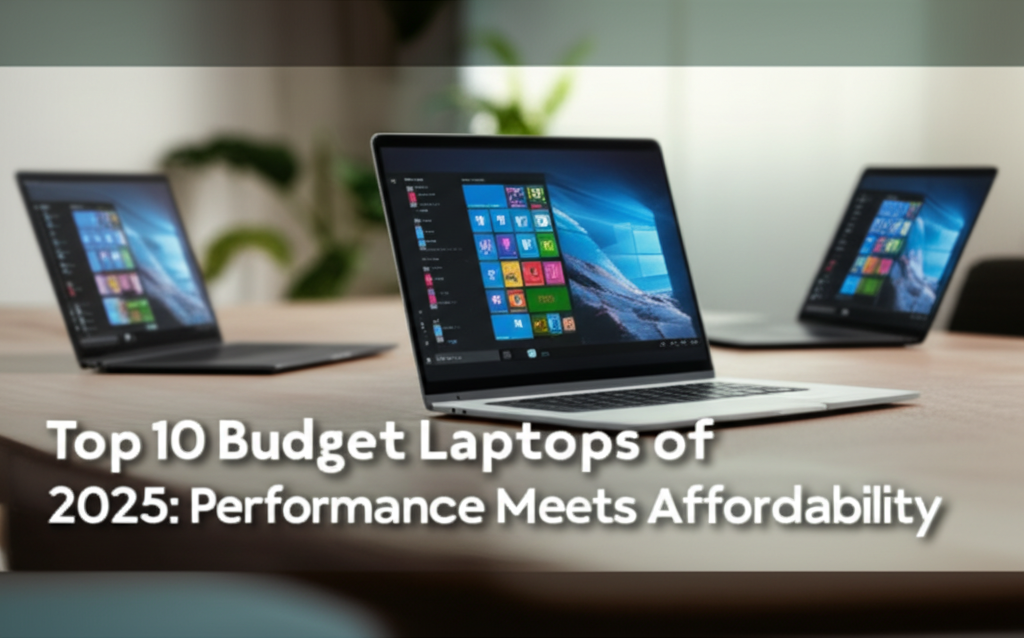Introduction
In the fast-paced world of technology, laptops have become indispensable tools for students, professionals, and casual users alike. As we approach 2025, the demand for budget-friendly laptops has surged, driven by a need for reliable technology that doesn’t break the bank. Whether it’s for online learning, remote work, or streaming your favorite movies, finding a laptop that combines performance with affordability is a top priority for many.
With advancements in technology, budget laptops are no longer synonymous with low performance. The market has seen a refreshing influx of devices that offer impressive specs without the hefty price tag. This article explores the top 10 budget laptops of 2025, providing a comprehensive guide for anyone looking to make an informed purchase.
Key Features to Look For
When shopping for a budget laptop, it’s crucial to identify the key features that ensure a smooth user experience. Here are the most essential aspects to consider:
1. Processor
The processor (CPU) is the heart of any laptop. For budget laptops in 2025, look for at least an Intel Core i3 or AMD Ryzen 3. These processors offer enough power for most everyday tasks, such as browsing, word processing, and light gaming. Mid-range options like the Intel Core i5 or AMD Ryzen 5 provide a significant boost for more demanding applications.
2. RAM (Memory)
RAM is crucial for multitasking. A minimum of 8GB is recommended for seamless operation in 2025. This amount allows users to run multiple applications simultaneously without lag. For heavier users or those who plan to use demanding software, consider laptops with 16GB of RAM.
3. Storage
SSDs (Solid State Drives) are the preferred storage option, as they significantly speed up boot times and application loading. Look for a laptop with at least 256GB SSD. For users needing more space, options with 512GB SSD or HDD (if used primarily for file storage) can be considered.
4. Display Quality
A good display is critical for an enjoyable viewing experience. Look for a laptop with at least a Full HD (1920×1080) resolution for clarity and color accuracy. IPS panels offer better viewing angles and color reproduction compared to standard TN panels.
5. Battery Life
A laptop’s battery life can make or break its usability, especially for students and professionals on the go. Aim for at least 8 hours of battery life for average use. Some budget laptops are capable of exceeding this, so check reviews and product specifications.
6. Build Quality
While budget laptops generally use more affordable materials, a durable chassis is important. Look for laptops with aluminum or high-quality plastic that can withstand the rigors of daily use. A portable design with a lightweight body also enhances convenience.
7. Ports and Connectivity
Ensure the laptop comes with a variety of ports (USB-C, USB-A, HDMI, etc.) to connect peripherals. Wi-Fi 6 and Bluetooth 5.0 are also valuable for ensuring fast wireless connectivity.
8. Operating System
Most budget laptops run on Windows 11, which is user-friendly and equipped with features suitable for both work and play. Chrome OS is another option for light users who primarily engage in web-based activities.
9. Keyboard and Touchpad
An ergonomic keyboard with good travel distance is vital for comfortable typing. A responsive and precise touchpad is equally important, especially for those who do not use an external mouse.
10. Warranty and Support
Lastly, ensure the laptop comes with a good warranty and readily accessible customer support. This safeguard can be invaluable in case of technical issues.
Top 10 Budget Laptops of 2025
Now that we have an understanding of what to look for, here’s a detailed look at the top 10 budget laptops of 2025, including their pros and cons.
1. Acer Aspire 5
Key Features:
- Processor: Intel Core i5
- RAM: 8GB DDR4
- Storage: 256GB SSD
- Display: 15.6” FHD IPS
- Battery Life: 10 hours
Pros:
- Good performance for multitasking
- Solid build quality
- Excellent battery life
Cons:
- Slightly heavier than competitors
- Average speakers
2. Lenovo Ideapad 3
Key Features:
- Processor: AMD Ryzen 5
- RAM: 8GB DDR4
- Storage: 512GB SSD
- Display: 15.6” FHD
- Battery Life: 8 hours
Pros:
- High storage capacity
- Comfortable keyboard
- Sleek design
Cons:
- Average webcam quality
- Limited port selection
3. HP Pavilion x360
Key Features:
- Processor: Intel Core i3
- RAM: 8GB
- Storage: 256GB SSD
- Display: 14” FHD Touchscreen
- Battery Life: 9 hours
Pros:
- 2-in-1 functionality
- Responsive touchscreen
- Lightweight and portable
Cons:
- Less powerful for intensive applications
- Average build quality
4. ASUS VivoBook 15
Key Features:
- Processor: AMD Ryzen 5
- RAM: 8GB DDR4
- Storage: 512GB SSD
- Display: 15.6” FHD
- Battery Life: 7 hours
Pros:
- Sleek and stylish design
- Larger SSD storage
- Good performance for everyday tasks
Cons:
- Mediocre battery life
- Display brightness could be improved
5. Dell Inspiron 15 3000
Key Features:
- Processor: Intel Core i3
- RAM: 8GB
- Storage: 256GB SSD
- Display: 15.6” HD
- Battery Life: 6 hours
Pros:
- Good entry-level performance
- Reliable brand support
- Comfortable keyboard
Cons:
- Lower display resolution
- Basic design
6. Microsoft Surface Laptop Go
Key Features:
- Processor: Intel Core i5
- RAM: 8GB
- Storage: 128GB SSD
- Display: 12.4” Touchscreen
- Battery Life: 13 hours
Pros:
- Portable and lightweight
- Excellent battery life
- High-quality touchscreen
Cons:
- Limited storage capacity
- Higher price for upgrades
7. Lenovo Chromebook Flex 5
Key Features:
- Processor: Intel Core i3
- RAM: 4GB
- Storage: 64GB eMMC
- Display: 13.3” FHD Touchscreen
- Battery Life: 10 hours
Pros:
- Great for lightweight tasks
- Versatile 2-in-1 design
- Affordable price
Cons:
- Limited storage
- Not suited for heavy applications
8. ASUS ZenBook 14
Key Features:
- Processor: AMD Ryzen 5
- RAM: 8GB
- Storage: 256GB SSD
- Display: 14” FHD
- Battery Life: 8 hours
Pros:
- Lightweight and portable
- Solid performance
- Long battery life
Cons:
- Higher price point for budget category
- Limited upgrade options
9. HP 14-dq2025nr
Key Features:
- Processor: Intel Core i3
- RAM: 8GB
- Storage: 128GB SSD
- Display: 14” FHD
- Battery Life: 8 hours
Pros:
- Compact design
- Decent performance for basic tasks
- Good display quality
Cons:
- Limited storage
- Average battery performance
10. Acer Chromebook 514
Key Features:
- Processor: Intel Celeron
- RAM: 4GB
- Storage: 64GB eMMC
- Display: 14” FHD Touchscreen
- Battery Life: 12 hours
Pros:
- Excellent battery life
- Affordable price
- Lightweight design
Cons:
- Lower performance for heavy tasks
- Limited storage capacity
Use-Case Scenarios
Students
For students juggling assignments, studying, and streaming, the Acer Aspire 5 or Lenovo Ideapad 3 offer excellent performance and storage, while still fitting a budget. The Microsoft Surface Laptop Go is an ideal choice for those needing lightweight portability.
Professionals
For professionals who require multitasking and productivity, the ASUS VivoBook 15 and Dell Inspiron 15 3000 cater well to office applications, while maintaining affordability. Acer Aspire 5 is another dependable choice with robust performance.
Casual Users/Light Gamers
Casual users or light gamers will benefit from the HP Pavilion x360’s 2-in-1 capabilities and touchscreen, while the ASUS ZenBook 14 offers excellent versatility and portability for on-the-go use.
Expert Recommendations: Budget vs. Premium Choices
When it comes to budget vs. premium choices, it boils down to your specific needs:
-
Budget Laptops: The laptops mentioned above offer fantastic value for money, particularly for basic tasks such as web browsing, media consumption, and office work. Models like the Lenovo Ideapad 3 and Acer Aspire 5 strike a perfect balance between performance and affordability.
- Premium Laptops: If you’re considering more complex tasks such as video editing or high-end gaming, invest in premium options. These will come equipped with better processors, more RAM, and enhanced graphics capabilities. Brands like Dell and HP offer great mid-range laptops in this segment, accommodating those who need more robust technology.
Ultimately, your decision should align with your personal needs and usage patterns. If your activities are mostly web-based and light coding or writing, a budget laptop is perfect. Conversely, if demanding applications are a regular part of your routine, bumping up to a premium option is worth the investment.
FAQs
1. What is the best budget laptop for students in 2025?
The Acer Aspire 5 is recommended for students due to its balanced performance, good battery life, and affordable price.
2. Can budget laptops handle gaming?
While budget laptops are not designed for intensive gaming, models like the ASUS VivoBook 15 with a decent processor can handle light gaming. For serious gaming, consider investing in a gaming laptop.
3. What should I look for in a laptop for remote work?
Key features include a good processor (at least Intel Core i5), 8GB RAM, a reliable webcam, and a solid battery life of at least 8 hours.
4. How can I extend my laptop’s battery life?
Optimize your settings by reducing screen brightness, closing unnecessary applications, and using energy-saving modes available in your operating system.
5. Are Chromebooks suitable for students?
Yes, Chromebooks like the Lenovo Chromebook Flex 5 are excellent for students primarily engaged in web-based tasks but might lack the performance needed for more demanding applications.
Buyer’s Checklist
When considering a purchase, use this checklist to ensure you make the best choice:
- [ ] Define your usage: Understand your primary tasks (e.g., browsing, gaming, video editing).
- [ ] Set a budget: Determine how much you can afford without compromising essential features.
- [ ] Check for key specifications: Focus on the processor, RAM, storage, display, and battery life.
- [ ] Read reviews: Look for feedback from other users to gauge performance and reliability.
- [ ] Consider warranty and support: Ensure good customer support to address any issues post-purchase.
Conclusion
Finding the right laptop doesn’t have to be a Herculean task. With a booming selection of budget-friendly options available in 2025, you can find devices that meet your needs without exceeding your budget. By focusing on key specifications, understanding your usage, and weighing your options, you can confidently choose a laptop that checks all the boxes for performance and affordability. Happy shopping!

